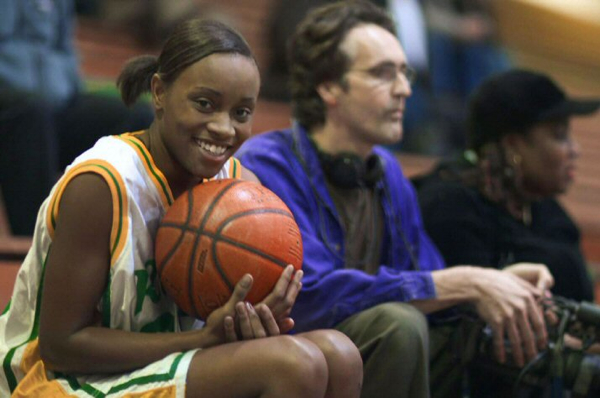Movie review by Greg Carlson
An entertaining if not always polished sports documentary along the lines of “Hoop Dreams,” “The Heart of the Game” presents the sometimes curious story of the Roosevelt High School Roughriders girls basketball team in Seattle, Washington. Peopled largely by white, middle and upper middle class students, Roosevelt saw its hardwood fortunes turn around with the arrival of University of Washington accounting teacher Bill Resler, a neophyte coach whose daughters had once attended Roosevelt. Director Ward Serrill frames the first part of the film around the unorthodox Resler, who immediately does away with any offensive strategy in favor of a relentless full-court press.
Resler miraculously turns the Roughriders into one of the most explosive teams in the state, and with each season, he introduces a new theme to his teenage gym rats. With evocative monikers like “Pack of Wolves” and “Tropical Storm,” these themes are as amusing to the audience as they are to Resler’s players. Something about them, however, resonates with the girls, who gleefully shout “Draw Blood!” during time-out huddles. Resler’s oddball strategies pay off, and attendance at games soars. Amazingly, Serrill followed the ups and downs of the team for seven years, which provides a real sense of continuity as the various story threads emerge and evolve.
Strangely, Serrill only highlights a few of the Roughriders as individuals, a frustrating tactic that no doubt disappointed some of the girls who fade into the background. Despite a gripping – but all too brief – glimpse at one player’s sexual victimization, “The Heart of the Game” shifts its attention during its second half to Darnellia Russell, a phenomenal basketball player whose decision to attend Roosevelt, and play on a team with mostly affluent white players, provides Serrill with the opportunity to comment as much on race as he does on gender. Russell’s off-court struggles, including a frustrating eligibility fight that ends up before a judge, make for engrossing viewing.
Serrill strains to make Russell the central story of his film, but many observers will be left wondering why more time was not spent examining the intense cross-town rivalry between the Roughriders and the Garfield High School Bulldogs, coached by two-time All-American and former Harlem Globetrotter Joyce Walker. Perhaps Serrill did not have the same kind of access to Walker as he did to Resler. Whatever the reason, it’s too bad, since Walker is every bit as intense and interesting as Resler.
Although the movie doesn’t seem to be aimed at teenagers, younger viewers might find plenty of interest in the film. Its PG-13 rating likely covers a handful of profanities, although it is far from shocking that in the locker room, high school girls express themselves as colorfully as their male counterparts. Underneath the falsely projected overconfidence that masks a strong dose of teenage insecurity, the Roughriders appear to learn a great deal from Resler. One of the movie’s strengths is the almost complete absence of parents; Resler instructs the girls of the team to form an inner circle to deal with conflicts. That he insists on his own exclusion is powerful stuff.
